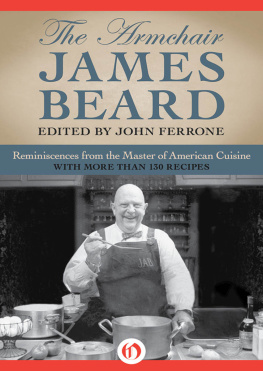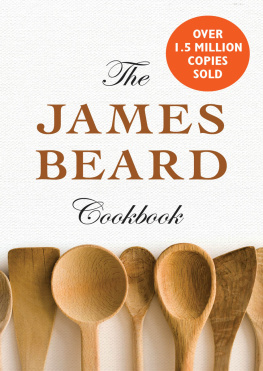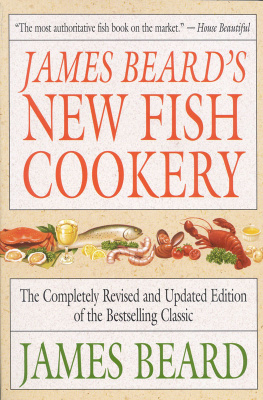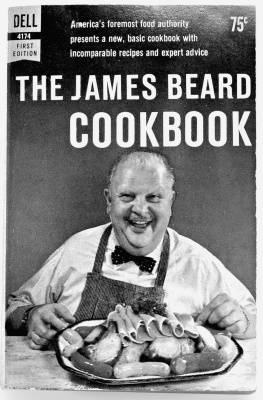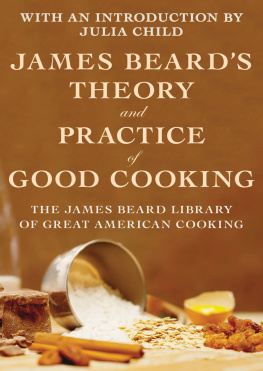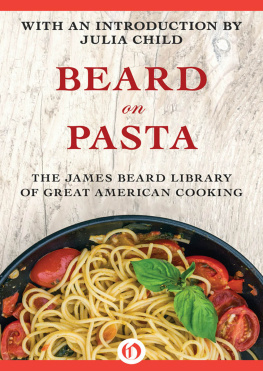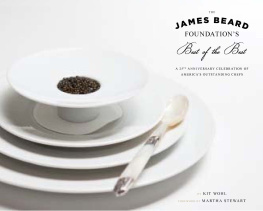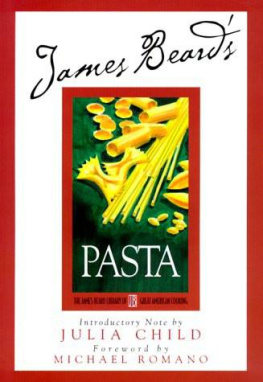The Armchair James Beard
James Beard
Edited by John Ferrone

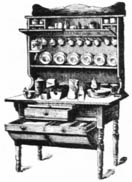
Contents
Foreword
Beard Revisited
What a treat John Ferrone has brought us with this book, a feast of articles by James Beard that have never before appeared in book form. As a longtime friend, collaborator, and worker with Beard, Ferrone saved these pieces from oblivion and sifted and annotated them with a knowledgeable eye. Of course, they give great pleasure; but do they matter?
It is natural that I would think so. I miss James Beard, as a friend, an intelligence, a repository of information, a wit, and as a lover of all things to do with food, opera, and gossip. I miss him as a teaching partner, dining partner, and a partner in abstruse gastronomical research that led to rarer and rarer books as well as more of our seemingly endless, crack-of-dawn conversations.
Somewhat less personally, what I miss about Jim, what I feel is the greatest loss to the American food scene, is his distinctively American voice. He fed our nostalgia for an America we may have never known but through which he lived. He recalls in this book, as in many others, the Northwest of his childhood where hams and game hung in the cellar; where Dungeness crabs, oysters, and fish were plentiful and peddlers came to the door selling cooked hominy and fresh vegetables. He was unabashedly enthusiastic, self-taught, forward looking, and eageruntil the end of his lifeto know the latest innovations of young chefs. He greeted new technologies such as the food processor, the electric stove, and the microwave oven with delight. He researched American food but felt equally connected to the food of his English mother, as well as the food of France, Italy, and South America. And even though he didnt cook it, he grew up with and was very comfortable with Chinese food. He voiced the best of America, the richness of the past, and a vision of the future.
With all the writing assistants and editors that Beard had, the voice in the writing over the years remained remarkably constant.
Many of his culinary passions reflected or predicted the tenor of the country, although he was never a slave to popularity. He loved outdoor cooking and wrote about it many times in his books and articles. Perhaps his large male presence presaged and encouraged the increased presence of men at the barbecue and in the kitchen. There were certainly many men in his classes. He enjoyed picnics and informality. He always served and recommended wine. He researched earlier American and American regional recipes. A substantial breakfast and tea as a meal surfaced repeatedly in his writing, along with the foods that comprised them.
In part, Beards writings could be read as a serial story of his food-world friendships. He encouraged people who he recognized as talented to enter that world, and carried them along with him from book to book and article to article. He was generous in promoting the work of those he believed in and cared about: Julia Child, M. F. K. Fisher, Helen Evans Brown, Paula Peck, Marcella Hazen, James Villas, and countless others.
The recurring characters of his more personal world included his oldest friend, Mary Hamblet; Leon Leonides of the Coach House, where he frequently lunched; Jeanne Owen (a formidable grande dame who created a vast array of food events) and her fried chicken; his first partners, Bill and Irma Rhode; Helen McCully, the first nonhome economics food editor of a major womans magazine; Clementine Paddleford, the idiosyncratic food editor of the Herald Tribune; and many others, including James Nassikas of the Stanford Court in San Francisco, where James Beard and I taught and where Beard virtually lived for part of the year. The list of names, even those in this wonderful book, could go on.
He took us into dozens of restaurants and introduced us to their chefs, from Lucas Carton in Paris to Quo Vadis in New York and the London Chop House in Detroit. He sponsored younger chefs and remembered those who contributed in the past, such as Louis Diat of the Ritz-Carlton.
Wherever his inquiring mind took himto books, people, or places, James Beard found recipes to share that enriched our lives. I will always miss him, but he lives again in this book. Thank you, Jim; thank you, John.
Barbara Kafka
Spring 1999
Introduction
James Beard was one of the countrys most influential and most publicized food authorities, and by now his history must be known to just about everybody who qualifies as a reasonably serious cook. But for those who are still in the dark about the origins of this extraordinary man, it wouldnt hurt to repeat a few facts of his life, leading up to his defection to the food world.
He was born in Portland, Oregon, in 1903. His father, who had come to Oregon from Iowa by covered wagon, was an appraiser at Portlands customs house. His mother, of English and Welsh ancestry, had owned and managed a small residential hotel. It was from her that Beard acquired a love of food and the theater, along with a precocious sophistication. He aspired to be a singer or actor or both. Not yet twenty, he went off to London to study voice with an assistant of Enrico Caruso, and lived for a time in Paris. When his goal of becoming a heldentenor seemed unpromising, he returned home to seek a career on the stage and in radio, sometimes keeping afloat with teaching and cooking jobs. His rotund six-foot-four frame limited his prospects, but he even had a go at Hollywood.
In 1937 he moved to New York to look for theater work, lived hand to mouth, and once again taught school to help pay the rent. The event that would steer him toward his true calling came late in 1938, when he met a German-born brother and sister as passionately interested in food as he was. They decided to form a catering service, Hors dOeuvre Inc., to exploit New Yorks cocktail habit. World War II brought it to an end, but out of it came Beards first cookbook, Hors dOeuvre and Canaps. In 1946 he appeared on the first cooking program ever televised, NBCs I Love to Eat. Theater and food had fused, and Beard was on his way up as gastronomic guru and champion of Americas culinary wealth. He died in New York in January 1985 after years of poor health, but preached good food right to the end.
James Beards twenty-some cookbooks (the count is debatable) are his most visible legacy, but he had just as much to say and said it louder and longer in hundreds of articles that lasted a month, a week, or a day and then disappeared into the void. For forty years or so in over thirty-five magazines and newspapers, he dispensed recipes and advice that collectively were nothing short of encyclopedic. Portions of this material were harvested for Beards cookbooksit could be said that the short-lived writing did legwork for the more enduringbut a good deal has stayed buried. This volume brings sixty-five articles to light.
Magazine assignments kept Beards pot boiling. They gave him needed income in the early years and were the chief stimulus for food research. Before he acquired a full-time staff in the seventies, he lived at the stove, playing with every conceivable facet of cookery. Evenreluctantlypackaged mixes. The assignments were usually dreamed up by food editors. Sometimes they were inspired by Beards latest travels. A 1963 stay in St.-Rmyde-Provence produced a Provenal Cook Book for

